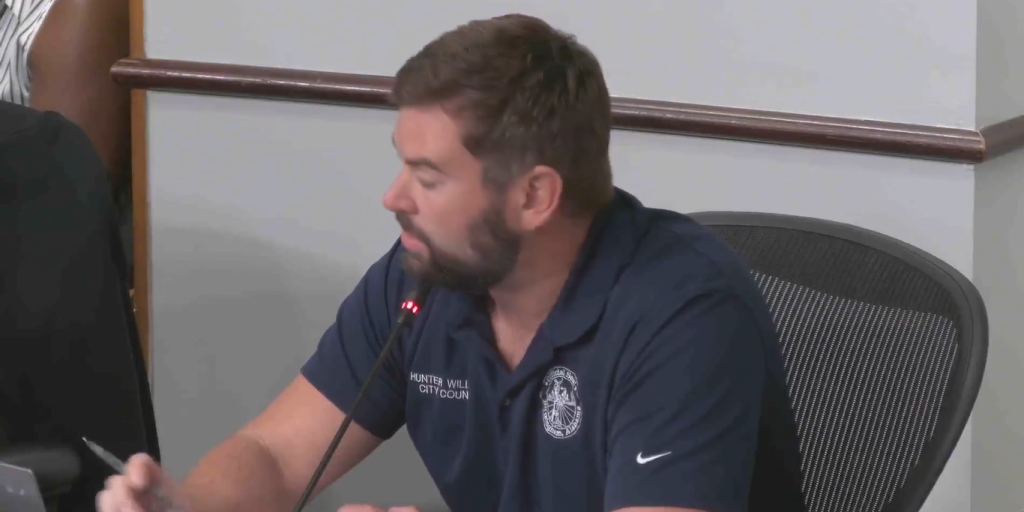Photo by https://perzonseo.com/
Cord Sachs is a Birmingham-based leadership expert and the CEO of FireSeeds, a company that helps companies find and grow great leaders and “the company behind many of Alabama’s fastest growing companies.”
The full conversation with Mr. Sachs can be heard on the Yellowhammer Radio podcast or in the video above, and a lightly edited transcript of his interview with Yellowhammer’s Andrea Tice and Scott Chambers can be read below.
Subscribe to the Yellowhammer Radio podcast on iTunes or Stitcher. Learn more about Cord Sachs and Fireseeds at www.fireseeds.com
Scott Chambers: Welcome back, Yellowhammer nation. I am Scott Chambers.
Andrea Tice: Andrea Tice here as well, and we’re going to head to the phones and talk to Cord Sachs right away with Fireseeds. Are you there, Cord?
Cord Sachs: I am. How you doing, Andrea?
Andrea Tice: Hey, we’re doing great. We’re doing great.
Scott Chambers: I’m doing great as well, Cord.
Andrea Tice: It’s his birthday month, so he’s having a blast.
Scott Chambers: Yeah, of course.
Cord Sachs: Oh, he’s one of those that gets a birthday month.
Andrea Tice: Oh yeah.
Scott Chambers: The month of Scott, my friend. The month of Scott. I’m unashamed in saying.
Cord Sachs: Yeah, my wife gets a birthday month as well.
Andrea Tice: Oh, how’s that-
Cord Sachs: So, I understand.
Andrea Tice: Okay.
Scott Chambers: There you go. June is the month of Scott. How are you doing today, my friend?
Cord Sachs: I’m doing great. I’m doing great. Great to be here. Great to continue the conversation.
Andrea Tice: Okay, well last week we talked about how to determine whether we have a good job or a great job, and you gave us three questions to work through. So what if someone heard this, and they went through those three questions, and now they had this kind of lights on moments where they’re like, “I’m not in a great job. Should I stay on just with a good job, or should I drop every thing and start looking for a great job?” Where would you take them from that point?
Cord Sachs: No, that’s hopefully where we brought our audience, to be able to really ponder and consider those questions. Let’s review them real quick. That’ll give us context for-
Andrea Tice: That’s a good idea.
Cord Sachs: … today as well. But yeah, so question one was, “Are you deeply passionate about what you’re doing right now?”
Andrea Tice: Uh-huh (affirmative).
Cord Sachs: So if you answered negatively to that, [inaudible 00:01:23] no, then okay, there’s a reason. Let’s begin to think of a plan. But maybe you said, “Yes, I am passionate.” Then, question two, “Can you be the best in the world with what you’re doing at your job?”
Andrea Tice: Mm-hmm (affirmative).
Cord Sachs: And so maybe the answer for that is affirmative as well, and you answered positively to both those questions. But maybe it was number three that got you. “What drives your personal economic engine?” And you realize, “Wow. Maybe I love what I’m doing, I’m deeply passionate about it. I think I can keep doing really good, and may be the best in the world at it, but you know, it just won’t take care of my family now that I’m about to get married and have kids.”
And so, if you answer no to any of those, it brings up … and especially to multiple of those questions … it brings up the question of what time table should I then be looking for the better job, for the great job? Because good isn’t great, and if we just settle for good, ultimately, we’re not going to be excited about the long term career that we’re in.
Scott Chambers: Right. Well, what if my answers were no to two or more, or to one or more of those questions? Do I stay in the current job I have, or does that tell me maybe you should look for something else?
Cord Sachs: Yeah, and I think the answer to that is I think you should be looking for something else, but at the rate, and the speed, the pace at which you need to be looking, the rate of urgency, would probably depend on a little more of the context. So, the question I would give you first is do you enjoy the company that you work for? Do you enjoy that environment?
Andrea Tice: Mm-hmm (affirmative).
Cord Sachs: And then, do you enjoy the people that you work with? Because if the answer to that is no, then I would say gosh, you probably need to pick up the pace on looking for a new opportunity. But if you did say yes, I really love this environment. I love the people I get to work with, it’s probably because they’re having a very positive impact on who you are. And so no job is worth staying in if the environment you’re in is causing you to negatively leave that job and then impact the people around you, usually at home, in a negative way. And so, it all depends. I would say yes if you did answer no to one of those questions. I’d say yeah, you need to start looking, but the rate depends on how positive the environment that you’re in.
Scott Chambers: And I hope I create a good enough environment here that you answered yes to all of those questions Andrea. Do you like working with me?
Andrea Tice: Uh-huh (affirmative).
Scott Chambers: I hope.
Andrea Tice: Do I have to answer on the air?
Scott Chambers: No, you don’t.
Andrea Tice: Okay. All right.
Cord Sachs: Yeah, you kind of put her in a hard spot.
Andrea Tice: Yeah, right.
Cord Sachs: [crosstalk 00:03:50] honest answer there.
Andrea Tice: Yeah, Cord, I might be getting your number later afterwards and talking, but anyways, for now let’s just stick on with the main topic. So, let’s say I say yes that I really do like the company I’m working with, and everything’s good, it may not be great but it’s good, is there a way that I should look to make my situation better where I’m at?
Cord Sachs: Absolutely, and I think this is the conversation that most people are just afraid to have, and it really is a scenario where most bosses are really open to having conversations about how can we put you in a better scenario within your current job now that is one where you could be more excited about it, you could do the job better, you could be on a track where you could produce more [inaudible 00:04:39]. I mean, most managers, most bosses, would welcome that conversation. I think we’re just hesitant to have it.
Andrea Tice: Uh-huh (affirmative).
Cord Sachs: And so I’d say the first question is, yeah, begin to have a conversation around what is the other opportunities? What’s the long play here in light of where could I grow in this organization, and potentially have more impact? And I think people will be very surprised to see their direct bosses or managers reeling in and say, “Wow, I’m excited that you’re asking that, because here’s a track here. There’s another track here.”
We just don’t want to stay in a seat on the bus that’s not our seat. And Jim Collins talks about another whole principle called you want to find the right bus. But then, sometimes you’re on the right bus, you just need to be moved into a new seat on the bus.
Andrea Tice: Well, that’s a great analogy, because if your job place is not toxic, it’s good, it’s healthy, there’s no reason to jump and leave that vehicle. But you’re right. Take the time to find out if you’re in the right seat.
Scott Chambers: Yeah, but how do you know what can be the right seat, and when you’re actually sitting in it though?
Cord Sachs: That’s a great question, because I think that’s where most people probably are. They’re in a good job, but they really love their job. They love the people they get to work with, but they just either don’t know yet of the other opportunities, the other seats on the bus that they could potentially move into, and so what I would ask someone is to apply the 80/20 rule. And what I mean here is you want to be in a position where 80% of the time you’re doing what you enjoy doing and what you’re really good at. And that’s what you want to be moving towards, that 80/20 ratio.
No one has a job where they 100% of the time get to do what they love and are really good at. There’s always 20% of your job that you just are going to have to grind through. But you should be moving towards that position in your career where you’re moving towards that 80/20 rule, and that 80% of the time I am doing what I’m passionate about and what I’m really good at. And it’s okay to be in a position right now to where maybe you’re 60/40. 60% of the time you’re doing what you love and you’re good at, and 40% you’re not, but as you look in the future you can clearly see a track that moves you closer to 80/20.
When we’re in trouble is when either we can’t see moving out of 60/40, because it will just burn you out. Or even worse, 50/50, or even flipping the scenario on the other side. But if you can see the light at the end of the tunnel, you can see if I grow in this opportunity I can move into a position that I will really enjoy. I think about the sales development role in entry level sales. Nobody really just loves and wants to stay in that entry level sales development role. All I do is prospect, right?
Scott Chambers: Right.
Cord Sachs: We want to move into that opportunity, that next opportunity where I get to be an account executive, and I get to really engage with people and run a whole account. But, that I may be willing, and should be willing, to stick that out for 12, 18 months, because I see the opportunity to move into more of the sweet spot.
Scott Chambers: Got you.
Cord Sachs: It’s just when you can’t see what the sweet spot could be in the future, is when we need to start having conversations with folks around us.
Andrea Tice: I appreciate you putting it out there, that whole 80/20 rule. It’s good for people to hear that, because you need the context to know that you’re having realistic expectations, and that you’re not thinking somehow there’s some perfect situation out there, and that you’re settling for less if you don’t have 100%. So it’s good to be reminded of that.
Scott Chambers: But, if it’s 70/30, it’s like, “Oh boy,” you know.
Andrea Tice: I think I just identified the 20% of my job … I think I’m looking right at him.
Scott Chambers: You’re looking at him. Hey. It’s 100/0 at Yellowhammer. We love what we do here, for real.
Cord Sachs: Yeah.
Scott Chambers: I do have a question though, Cord. If you’re on the other end of that spectrum, what if I reach the conclusion that this just is not the job, this isn’t the place that I need to continue in? What do you do then?
Cord Sachs: Yeah. And this is where, okay, you really need to begin your own personal search. Obviously you’re going to do this in a very strategic way. You’re not going to go announce to everybody that you’re starting to look for a job, but you need to start to look for what else is out there. I love to tell people to apply the principle. Find mentors. Find people that know you really well, and that are connected in the community, and see if you can get them … buy them a cup of coffee, and ask them for advice. There’s a great principle. If you ask people for a job, they’ll give you great advice. If you ask people for advice, they’ll point you in the direction of a job.
Scott Chambers: Interesting.
Cord Sachs: Yeah, it really is true. I’ve applied this early in my career as well. When I call up that CEO and I say, “Man, I really want to talk to you because I really need a job,” he’s thinking oh man, that’s a lot of pressure. I don’t know if I have anything, and he just puts me off, and puts me off, and puts me off.
Andrea Tice: Sure.
Cord Sachs: But if I call him up and say, “Hey, you know, I know you know me really well. I’m moving into a season where I’d really love to seek your advice around just my next season of impact. Would you mind having a cup of coffee with me?” A lot of times I would end that conversation with him saying, “Hey, I need to connect you to Joe. I need to connect you over here to Sally, because I think you’d be a great fit here.” Or, “Man, you really need to talk to this person.”
Andrea Tice: Yeah.
Cord Sachs: And so they were more open to have that conversation.
Scott Chambers: All right, Cord, we’re down to the final 20 seconds, and the computer cuts us off, any other things we should consider?
Cord Sachs: No. I’d just say, yeah, put your feelers out. Talk to as many recruiters as you can. We’re here to help. That’s what most people don’t realize. Look on LinkedIn for opportunities-
Scott Chambers: FireSeeds.com. Check out Cord Sachs. We’re back tomorrow. Thanks Cord!













